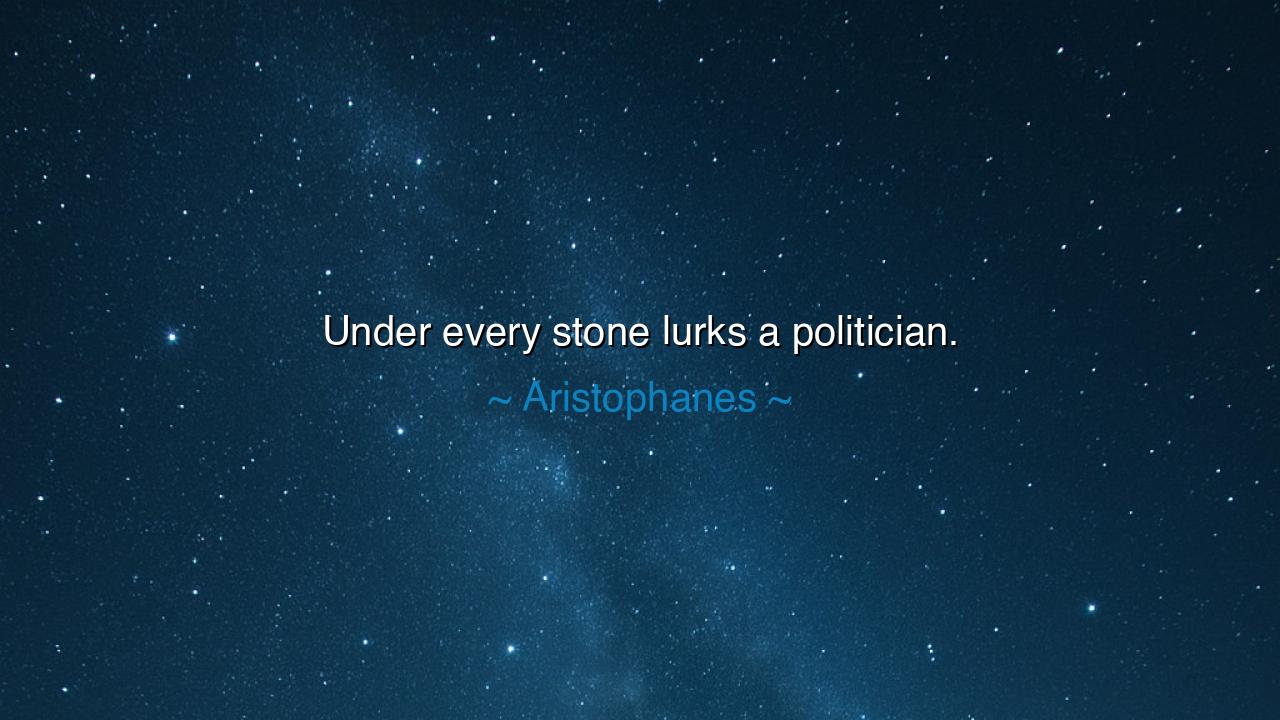
Under every stone lurks a politician.






The words of Aristophanes — “Under every stone lurks a politician.” — rise from the oldest stages of comedy in Athens, sharp with irony and satire. Aristophanes, the playwright who mocked generals, philosophers, and public men, was no stranger to the ways of politics. His wit was a mirror to his city, showing that wherever one looked, in every shadow and beneath every stone, there was always a schemer waiting to crawl forth, eager to grasp power.
The meaning is biting but timeless. The politician, in Aristophanes’ view, was not rare or noble but common, crawling everywhere like insects under rocks. They thrive in the hidden places, in the cracks of society, where schemes are spun away from the light. His words reflect the cynicism of a people who had seen their democracy abused — where orators shouted of patriotism while seeking wealth, and leaders cloaked ambition in the garments of public service.
History proves the jest. In Athens itself, during the Peloponnesian War, men like Cleon rose to prominence, loud in their rhetoric and ruthless in their ambition. He stirred the people with fiery speeches, promising victory, yet his leadership brought Athens nothing but further bloodshed. Aristophanes himself mocked Cleon in his plays, showing how such politicians were always ready to spring from hiding, like vermin beneath a stone, whenever opportunity promised them gain.
Yet the truth is not bound to Athens alone. In every age, from Rome’s Senate to modern parliaments, men and women of politics emerge in endless number, often more concerned with personal survival than the public good. The warning in Aristophanes’ quip is clear: beware the hidden, for the politician is not far away. They wait, they watch, and they rise when least expected.
Let this wisdom endure: vigilance is the duty of the people. For while not all who serve are corrupt, the abundance of politicians reminds us that power attracts the ambitious as honey attracts flies. Aristophanes’ words, though wrapped in laughter, carry the weight of prophecy — that democracy survives not by trusting that there are few politicians, but by guarding against the reality that they lurk everywhere, beneath every stone, waiting for their moment to crawl into the light.






DHnguyen danh hung
Aristophanes’ view of politicians as lurking figures almost seems timeless, as if it has always been true across history. Is this the way politics has always been, or is it a reflection of our modern disillusionment with the system? How can we change the narrative around politics so that politicians are viewed as agents of positive change, rather than figures to be suspicious of? What would it take to restore trust in political leaders?
MKTRAN MINH KHOI
This quote strikes me as a reflection of the tension between public trust and political ambition. Politicians are often seen as calculating, and this quote seems to embody that idea. Can we ever truly trust political figures, or are we always going to be skeptical of their motives? How do we create a political culture where leaders are genuinely concerned with the people they serve, rather than their own advancement?
CTMui Chu Thi
I love how Aristophanes captures the essence of how some people feel about politics. It’s a reminder of the mistrust and cynicism many have toward politicians. Why do you think politicians are often seen as lurking figures, ready to pounce on opportunities? Is this always the case, or do we have examples of politicians who truly work selflessly for the public good? How do we distinguish between true leadership and opportunistic behavior?
TTThanh Thanh
This quote seems to imply that politicians are sneaky or always looking for an angle. It’s interesting because it might suggest that politics is a game of hidden motivations. Do we, as citizens, ever really know what’s happening behind the scenes, or is everything calculated and manipulated for political gain? Is there a way to make politics more transparent and trustworthy, or is it always going to feel like there’s something lurking underneath?
Ppvn
Aristophanes’ quote paints a rather cynical view of politicians, suggesting that they are always lurking and ready to emerge from unexpected places. Is this an indictment of the nature of politics, or does it reflect a general mistrust of authority? In today’s world, do we still view politicians as opportunistic figures, waiting for the right moment to strike? How can we restore faith in our political leaders and reduce the suspicion that surrounds them?